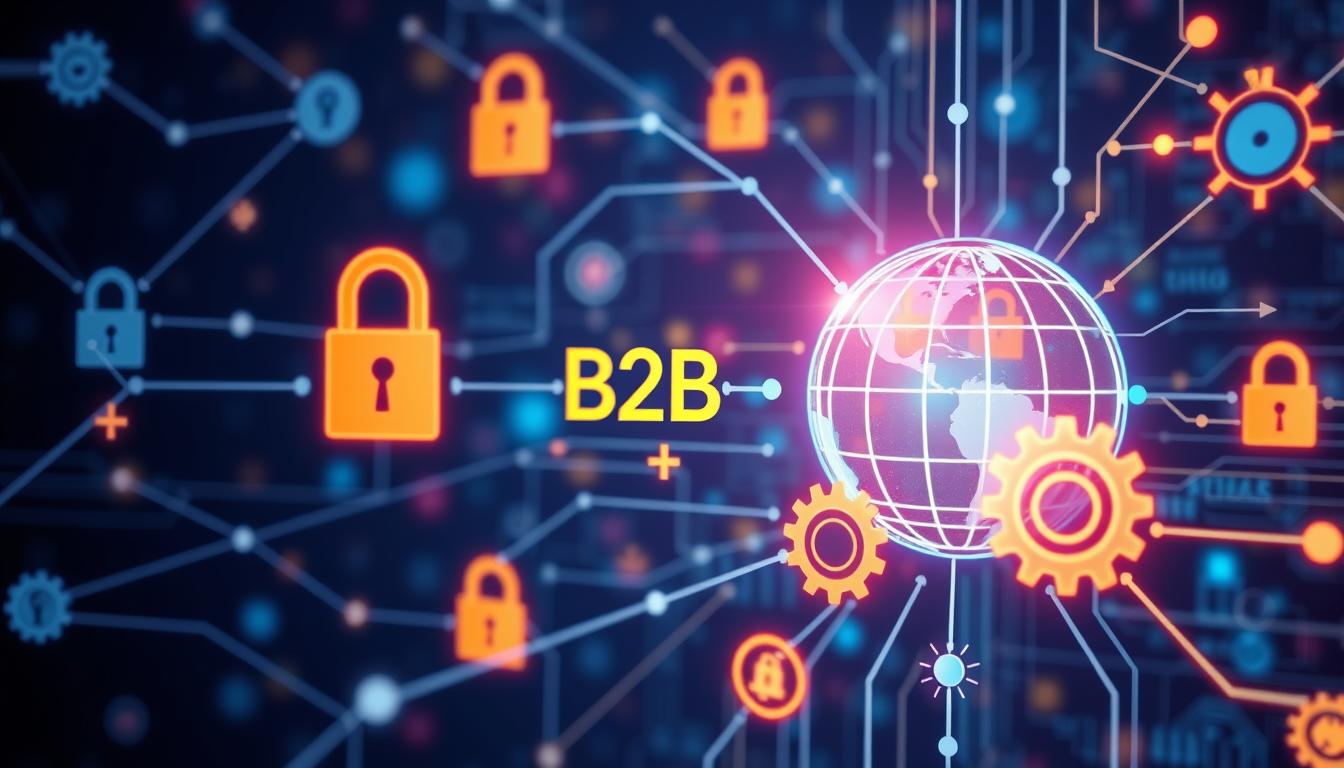Last Updated on December 9, 2025
In today’s digital world, smart contracts are transforming B2B transactions. They use blockchain technology to automate and secure agreements, cutting out the middleman. This innovation boosts efficiency and simplifies complex processes. McKinsey & Company predicts smart contracts could save the business sector $50 billion by 2025. By the end of this article, you’ll see how smart contracts are changing the transaction landscape and building trust among B2B companies.
Key Takeaways
- Smart contracts potentially save businesses billions, enhancing profitability.
- Automated contract execution streamlines processes, leading to faster transactions.
- Blockchain technology enhances trust and security in B2B agreements.
- Companies can explore innovative operating models through smart contracts.
- Smart contracts eliminate middlemen, reducing costs significantly.
- Emerging trends in blockchain are revolutionizing sectors like finance and insurance.
Understanding Smart Contracts
Diving into the world of smart contracts, it’s crucial to understand their core components. These tools mark a significant leap in agreement formation and execution. Smart contracts are self-executing, with terms encoded in code. This coding enables automation, streamlining transactions and cutting out intermediaries.
Definition and Core Features
Smart contracts are known for their transparency, security, and automated execution. They run on decentralized blockchain networks, ensuring data integrity and reducing fraud risks. As the global smart contracts market is set to hit $345 million by 2027, their role in various sectors is expanding.
Historical Context and Evolution
The concept of smart contracts dates back to 1994, when Nick Szabo introduced it. However, Ethereum’s launch in 2015 was a game-changer, enabling the widespread use of these contracts. The evolution of smart contracts has revolutionized business processes, making them quicker and more efficient. It has also reduced the need for traditional legal frameworks.

How Smart Contracts Work
Grasping the mechanics of smart contracts is essential for those aiming to harness their potential. The process of smart contracts starts with their creation and deployment on a blockchain. These digital agreements are written in a unique programming language. This allows them to automate tasks securely and efficiently. Once active, the smart contract becomes an unalterable record, safeguarding the agreement’s terms from any tampering.
Process of Creation and Deployment
The creation and deployment of smart contracts involve several critical steps:
- Writing the smart contract code, which outlines the agreement’s terms.
- Deploying the contract onto a blockchain, linking it to specific assets or data.
- Ensuring all parties have access to the contract for transparency.
This detailed process results in dependable contracts. They can execute automatically when conditions are fulfilled.
Conditions and Execution Mechanism
Smart contracts function based on specific conditions, often in the form of “if-then” statements. The execution mechanisms depend on these conditions being confirmed through decentralized consensus. This confirmation is vital for ensuring the contract’s accurate and efficient execution. Key advantages include:
- Elimination of intermediaries, saving time and resources.
- Enhanced trust through automation, reducing human error.
- Real-time monitoring of contract status, streamlining operations.
Smart Contracts B2B
In the ever-evolving business landscape, the integration of business-to-business smart contracts marks a significant shift. These smart contracts automate and enforce agreements, eliminating the need for intermediaries. This not only accelerates processes but also boosts compliance, reducing delays typical of traditional methods.
Transforming Business Transactions
Smart contracts transform business transactions by addressing fundamental inefficiencies. They utilize blockchain technology to create a secure environment where data integrity is key. This transparency minimizes dispute likelihood, building trust among parties. As more organizations embrace this technology, we expect to see increased adoption and utilization.
Key Benefits for B2B Enterprises
Organizations that adopt smart contracts enjoy numerous benefits. Key advantages include:
- Cost Reduction: Smart contracts can significantly lower transactional costs. For example, investment banks could save up to $12 billion annually through streamlined operations.
- Security and Transparency: Blockchain’s decentralized nature enhances agreement security, safeguarding critical financial data from unauthorized access.
- Faster Transactions: Automated processes lead to quicker B2B transactions, enabling businesses to swiftly adapt to market changes.
- Increased Trust: These contracts ensure compliance and accuracy, creating a trustworthy environment for long-term partnerships.
As financial and operational interactions evolve, understanding and leveraging smart contracts’ benefits is crucial. It can lead to a more efficient and interconnected business environment.
Real-World Applications in B2B
Smart contracts are transforming industries by making operations smoother and more transparent. They are crucial in supply chain management, procurement automation, and financial transactions. These areas see significant benefits from smart contracts, allowing businesses to work more efficiently and securely.
Supply Chain Optimization
Smart contracts are essential in supply chain management. They enable real-time tracking of products, documenting each step securely on the blockchain. This ensures transparency, preventing counterfeiting and ensuring compliance. Automatic payment upon delivery eliminates delays and disputes, strengthening relationships among stakeholders.
Procurement Processes
In procurement automation, smart contracts streamline ordering and payment processes. They reduce administrative tasks, improve accuracy, and lower human error. Businesses can manage orders, contracts, and invoices efficiently, saving time and boosting departmental efficiency.
Financial Transactions and Settlements
Smart contracts provide a reliable solution for automating financial settlements. Their clear execution paths reduce dispute likelihood. This, combined with blockchain verification, boosts trust and transparency. It enables smoother cross-border transactions, opening up new business avenues.

Efficiency in B2B Transactions
Smart contracts are transforming B2B transactions, making them more efficient. They significantly reduce transaction time by automating agreements. This automation eliminates the delays caused by manual processes.
Reduced Transaction Times
Electronic systems, like E-checks, are key to faster processing. They outpace traditional paper checks, offering quicker turnaround times. This gives businesses a competitive edge in B2B transactions. It simplifies payment processes and ensures funds are accessed swiftly, crucial for smooth operations.
Lower Costs and Administrative Overhead
Smart contracts and E-checks also lead to cost reduction. They cut down on expenses for paper, printing, and postage. Additionally, they reduce the need for intermediaries, lowering administrative costs. This allows companies to focus on strategic resource allocation, boosting productivity. E-checks’ transparency and traceability aid in informed financial decisions, enhancing B2B management.
Blockchain Technology and Smart Contracts
The fusion of blockchain technology with smart contracts is reshaping the business transaction landscape. This synergy enables decentralized transactions, enhancing both security and transparency in B2B interactions. It offers substantial benefits for companies aiming to modernize their contractual processes.
Decentralized Business Transactions
Blockchain technology eliminates the need for intermediaries in transactions. This direct interaction between partners speeds up the contracting process. Accenture’s Blockchain for Contracts, for example, simplifies agreement drafting and execution. It allows for real-time collaboration across different locations.
- All parties share access to the same data securely.
- Each contract version is tamper-evident, ensuring a reliable history and audit trail.
- Instant execution of commands occurs without delays, significantly improving operational efficiency.
Enhanced Transparency and Security
Blockchain technology and smart contracts boost transparency in B2B dealings. A shared database allows parties to view, revise, and accept changes securely. This setup promotes accountability and prevents fraud by making agreements unchangeable.
- Encrypted data sharing enhances security without compromising transparency.
- All parties agree on the same unalterable document, reducing reconciliation efforts and disputes.
- The platform promotes environmentally friendly practices by minimizing the need for physical documentation and storage.
The increasing need for smart contract developers highlights blockchain technology’s importance. Adopting these features can greatly enhance your business operations. It fosters trust and efficiency in transactions.
Challenges in Implementing Smart Contracts
Implementing smart contracts comes with several challenges with smart contracts that businesses face. As they expand across different sectors, tackling these obstacles is crucial for success. It ensures the smooth operation and implementation of these contracts.
Technical and Legal Obstacles
The blend of technology and law brings forth various legal issues. A major concern is the lack of clear regulatory frameworks for smart contracts. Their complex and decentralized nature often leads to confusion over jurisdiction and applicable laws. Traditional litigation struggles to handle disputes due to the unique nature of smart contract technology.
Arbitration might offer a more flexible solution, but it may not be effective for automated transaction disputes. Moreover, coding errors could lead to unintended outcomes, making clear legal guidelines essential. Businesses must find reliable ways to address these challenges when using smart contracts.
Scalability and Interoperability Issues
Scalability problems are another major concern. As more transactions occur on blockchains, network congestion can slow performance and transaction speeds. Companies need effective solutions to ensure their smart contracts can handle large volumes efficiently. Ensuring interoperability between different blockchain platforms also poses challenges, requiring innovative solutions for seamless communication.
For more insights on overcoming these hurdles in smart contract implementation, visit this resource.

Future Prospects of Smart Contracts in B2B
The landscape for smart contracts in B2B is rapidly evolving. Emerging technologies and shifts in the industry are driving their adoption and functionality. Trends in blockchain are pushing companies towards maximizing efficiency and reducing costs. This makes smart contracts a pivotal tool for the future of business transactions.
Emerging Trends and Innovations
As industries increasingly adopt smart contracts, several trends will shape their future:
- Integration with Artificial Intelligence: Smart contracts are starting to incorporate AI capabilities, enhancing decision-making processes.
- Growth of Decentralized Finance (DeFi): The rise of DeFi solutions is broadening the applications of smart contracts beyond traditional realms.
- Interoperability Enhancements: New technologies aim to improve smart contract integration across diverse blockchain platforms.
Potential Market Growth
Market growth for smart contracts remains optimistic. Statistically significant shifts suggest that as more businesses embrace blockchain, the future of smart contracts could redefine operational frameworks. Experts anticipate a surge in demand driven by:
- The need for automated solutions that can simplify complex agreements.
- Enhanced data security and transparency that blockchain technology inherently provides.
- Growing recognition of the efficiencies gained through reduced administrative burdens.
Conclusion
The advent of smart contracts marks a significant shift in B2B transactions. They bring about enhanced efficiency, cost reduction, and increased transparency. This makes them a crucial tool for today’s businesses. As technology evolves, smart contracts help companies stay competitive.
Reflecting on your business’s future, grasping the value of smart contracts in B2B is essential. They promote trust and simplify processes, giving companies a competitive advantage. The rapid growth of the global copy trading market underscores the need for these innovations.
Adopting smart contracts could lead to a more secure, efficient, and agile B2B environment. For deeper insights into automating processes and boosting your business with smart contracts, explore this resource. Embracing this technology ensures your business stays ahead in the industry.








